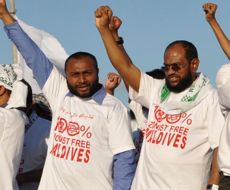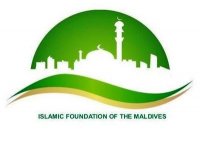Religious conservatism and extremist violence have been increasing in the Maldives over the past decade, while incidents of Maldivians joining overseas jihadist groups are becoming more common, according to a report published in the Combating Terrorism Center (CTC) Sentinel, a publication based out of the West Point military academy in the US.
The article entitled The Threat from Rising Extremism in the Maldives, observes that growing religious extremism and political uncertainty could result in more violence and negatively affect the nation’s tourism industry, which would be “devastating” to the Maldives.
“This has coincided with a number of violent attacks on liberal activists and other citizens who have expressed outspoken support for moderate religious practices,” the report notes.
If current trends continue “extremist incidents may rise, with violence targeted against the country’s more liberal citizens,” it states.
According to the report, five key factors have contributed to the growing extremism and violence:
- the encouragement of “more hard line Islamist elements in the country” during the 30 year autocratic rule of former President Maumoon Abdul Gayoom;
- political uncertainty;
- an increasing number of people seeking education in foreign madrasas;
- grassroots radicalisation through civil society and political parties;
- escalating extremist incidents of violence and involvement with jihadist groups.
“The country has already suffered one terrorist attack targeting foreign tourists, and a number of Maldivians have traveled to Pakistan’s tribal areas to receive jihadist training. Moreover, evidence exists that jihadists tried to form a terrorist group in the country in 2007-2008,” the report states.
The study recommends that Maldivian political and religious developments be followed closely.
Encouraging of hard line Islamic elements
Islam was introduced to the Maldives in the 12th century and subsequent religious practices have been the “moderate, more liberal form of the religion”.
“Yet, during Gayoom’s three decade autocratic rule, the Egyptian-trained religious scholar enacted a number of measures that, at least inadvertently, encouraged more hard line Islamist elements in the country,” the report concluded.
“From imposing a ban on Christian missionary radio to apprehending migrant service providers for allegedly preaching and practicing their own religion, Gayoom’s regime initiated an era of state-backed religious intolerance and radicalisation in the Maldives.”
The Protection of Religious Unity Act, passed in 1994, mandated that no other religion but Islam could be practiced.
In 1996, Gayoom constituted the Supreme Council for Islamic Affairs, renamed the Ministry of Islamic Affairs in 2008, to preside over religious affairs in the Maldives.
“This body of clerics pressured the government to carry out moral and cultural policing of alleged “anti-Islamic activities”,” the report states.
For example, in 2008 the Ministry requested police “ban nightclubs and discotheques for New Year’s Eve celebrations because they were contrary to Islam”.
“By the end of Gayoom’s time in office in 2008, the dress code for women had grown increasingly conservative, and more and more men grew out their beards,” the report states.
Women now dress more conservatively with fewer brightly colored clothes. Instead they “increasingly wear black robes and headscarves and on more conservative islands such as Himandhoo, women wear black abayas and face veils,” it added.
Political uncertainty
The democratic transition “gave a greater voice to religious conservatives and those calling for the rigid implementation of Shari`a (Islamic law) in the Maldives,” states the report. “This became especially evident following the implementation of political reforms and the transition to multi-party democracy in 2008.”
The first democratic presidential elections in the Maldives were held in 2008, with Mohamed Nasheed defeating Gayoom in the second round with 54 percent of the votes.
However, the Nasheed administration was accused of defiling Islam by “promoting Western ideals and culture and restricted the spread of more austere Islamic practices,” the article notes.
This resulted in the December 2011 “Defend Islam” protests led by opposition political parties, religious groups, civil society organisations and thousands of supporters in the country’s capital, Male’.
These protests “unleashed a chain of events that culminated in a bloodless coup on February 7, 2012 that toppled the Maldives’ first democratically-elected government,” declared the study.
Appeal of education in foreign madrasas
Education in foreign madrasas has also contributed to growing extremism within the Maldives, with students “unwittingly attending more radical madrasas” and preaching these views upon their return.
“The offer of free education in madrasas in Pakistan and Saudi Arabia is widely acknowledged as a core means of radicalising Maldivians locally, with well-meaning parents sending their children off on scholarships to ‘study Islam’,” the report states.
Following the 2007 terrorist attack in Male’s Sultan Park, “Gayoom himself warned of this problem”.
“Maldivians are influenced by what is happening in the world. They go to Pakistan, study in madrasas and come back with extreme religious ideas,” the report quoted Gayoom as saying.
Grassroots radicalisation
“The contemporary Maldivian political environment favors radical and political Islam taking root in Maldivian society, especially when political parties and civil society increasingly take refuge in religion,” the report states, citing Maldivian academic Dr Azra Naseem.
In 2010, new regulations prohibited “talking about religions other than Islam in Maldives, and propagating such religions through the use of any kind of medium.” The Ministry of Islamic Affairs published this legislation under the Protection of Religious Unity Act of 1994.
However, the report found that the “major force behind more austere religious practices in the Maldives is the Adhaalath (Justice) Party (AP), which has controlled the Ministry of Islamic Affairs, with Sheikh Shaheem Ali Saeed as its current minister”.
Given that the AP supports strict implementation of Shari’a Law, the party has “outspokenly argued that music and singing are haram (forbidden) and called for an end to the sale of alcohol at the country’s hundreds of luxury resorts,” said the report.
In February 2013, Saeed warned that “various Christian organisations and missionaries are strongly involved and active in our society because they want to ‘wipe out’ Islam from the Maldives”. He subsequently started a campaign against Christians and “Freemasons”, the report stated.
Two non-government organisations (NGOs), Jamiyyathu Salaf (JS) and the Islamic Foundation of Maldives (IFM), are considered religiously conservative Salafists who “work with the country’s political parties to further the cause of Islamism in the Maldives,” the report stated.
Extremist incidents
Extremists have directly targeted Maldivian liberal intellectuals, writers and activists, the study notes.
“On January 3, 2011, assailants attempted to kill Aishath Velezinee, an activist fighting for the independence of the country’s justice system, by stabbing her in the back in broad daylight,” said the report.
Velezinee is a whistleblower that in 2010 identified members of the Judicial Service Commission (JSC) who were “conspiring with key political figures to hijack the judiciary and bring down the country’s first democratically-elected government,” the report added.
The study found that the Ministry of Islamic Affairs was “at least indirectly encouraged extremism” by initiating “crackdowns” on media outlets for anti-Islamic content.
The blog of prominent free speech and religious freedom campaigner, Khilath ‘Hilath’ Rasheed, was blocked in 2011. A month afterward, Rasheed’s skull was fractured when 10 men attacked him with stones during a peaceful rally he organised in Male’.
Rasheed was arrested a few days after the incident and jailed for 24 days for participating in the rally.
In June 2012, Rasheed was nearly killed “after extremists cut his throat open with a box cutter”.
“After the attempt on his life, Rasheed named three political leaders—Islamic Affairs Minister Mohamed Shaheem Ali Saeed, Adhaalath Party President Imran Abdulla and Jumhooree Party lawmaker Ibrahim Muttalib Shaheem – as being indirectly responsible for the attempt on his life,” the report states.
Later in 2012, the moderate religious scholar and lawmaker, Afrasheem Ali, was stabbed to death at his home in Male’. He was considered an Islamic moderate who was “outspoken in his controversial positions,” reads the report.
In February 2013, “a reporter for the Maldivian Democratic Party (MDP)-aligned Raajje TV station, Ibrahim ‘Aswad’ Waheed, was beaten unconscious with an iron bar while riding on a motorcycle near the artificial beach area of Male’,” the study added.
Previously, during the 2011 South Asian Association for Regional Cooperation (SAARC), protesters “intolerant toward other religious and cultural symbols” damaged monuments gifted to the Maldives by Pakistan, Bhutan, Sri Lanka.
Islamic radicals on February 7 2012 also vandalised archaeological artifacts in the National Museum that were mostly ancient Hindu and Buddhist relics, destroying 99 percent of the evidence of Maldivian pre-Islamic history.
Jihadists
“In April 2006, a Maldivian national, Ali Jaleel, and a small group of jihadists from the Maldives attempted to travel to Pakistan to train for violent jihad in Afghanistan or Iraq,” the report reads.
While his first attempt was unsuccessful, Jaleel did eventually travel to Pakistan and “launched a suicide attack at the Inter Services Intelligence (ISI) headquarters in Lahore in May 2009.”
In September 2007, Islamic extremists committed a terrorist attack in the Maldives aimed at the tourism industry.
A bomb exploded in Male’s Sultan Park and wounded 12 foreigners. The three men arrested and later jailed for the bombing confessed that their goal was to “target, attack and injure non-Muslims to fulfill jihad,” states the report.
A month following the bombing, the investigation led to Darul-Khair mosque on Himandhoo Island. However, “some 90 masked and helmeted members of the mosque confronted police, wielding wooden planks and refusing to let the police enter,” said the report.
Although the Maldivian army eventually established control, “The stand-off resulted in a number of injuries, and one police officer had his fingers cut off.” In November, a video of the mosque confrontation was posted on the al-Qa’ida-linked alEkhlaas web forum by a group called Ansar al-Mujahidin with the message “your brothers in the Maldives are calling you,” the report states.
Evidence suggests that three Maldivian jihadists planned to establish a terrorist group in the country around 2007-2008 and send members for military training in Pakistan.
“At least one of these individuals did in fact travel to Pakistan, as Yoosuf Izadhy was arrested in Pakistan’s South Waziristan Agency in March 2009, along with eight other Maldivians,” states the report.
In 2009, then-President Nasheed warned that “Maldivian people are being recruited by Taliban and they are fighting in Pakistan,” quotes the report.
“Despite its reputation as an idyllic paradise popular among Western tourists, political and religious developments in the Maldives should be monitored closely,” the report concludes.
Likes (0)Dislikes
(0)Dislikes (0)
(0) 
